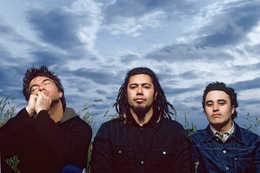TrinityRoots - A True Story
TrinityRoots present their debut album this May, TRUE!
After nine months in the making, TrinityRoots have found the voice and vibe of their debut album True. What started as an optimistic three-week session in Central Hawkes Bay ended as an education in trying to embody the live nature and spirit of TrinityRoots as a recorded sound.
7 May 2002
From the Newtown basement studio, the boys Ricky Gooch, Warryn Maxwell and Rio Hemopo let me join them for a sneak preview of some of the tracks from the forthcoming 'True' album. The band makes special mention of former drummer Darren Mathiassen who after two years drumming with Trinity Roots, left late last year to pursue his own musical direction Darren's solo track 'D by D' appears on the album - True. Their Newtown studio is the final part in a recording journey that has taken over nine months.
The studio itself is a symbol of the collaborative nature of TrinityRoots and the associated musicians within the Wellington scene, made up of a pro-tools set up flanked with gear borrowed from other Wellington bands such as The Black Seeds and Ebb. All the band members play in other bands in and around Wellington, including Jonathan Crayford's band, Fat Freddy's Drop and The Bad Apple Orchestra. This collaborative spirit comes through in the album, which features newcomer vocalists Stefanie Hearfield and Natalie McCormack, plus a range of scene stalwarts including Jonathan Crayford, Nils Olsen (CL Bob), Tim Jarrey (Optimus Prime/CL Bob), Steve Gallagher (Breathe), Toby Laing (Black Seeds/Fat Freddy's Drop/CL Bob), David Long (Muttonbirds), Dan Yeabsley (Twinset) and in the choir , Lisa Preston and Lisa Tomlins (Ebb).
The location where TrinityRoots started recording their album represents the vibe of True - A new project steeped in history. Oruawharu is a colonial house in Southern Hawkes Bay's Takapau. Oruawharu personifies the history that TrinityRoots embody in their sound: from the acoustic flavours of Maori party songs sung around a fire to the roots of black music's soul jazz and blues. Oruawharu also represents the content of True and the feelings it conjures in listeners, the new musical forms explored are merely a hybrid of old ones; like walking around an old and empty house, you can feel the history, the ghosts in it's bones.

